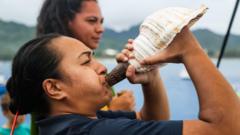Plans to explore deep-sea mining in the Cook Islands have become a contentious issue, sparking strong opposition from environmental activists as the government seeks economic opportunity in the valuable polymetallic nodules resting on the ocean floor. These nodules are rich in metals such as cobalt, nickel, and manganese, essential for the ever-growing demand for batteries that power everything from electric vehicles to smartphones.
Prime Minister Mark Brown is a vociferous advocate for the initiative, envisioning a future where mining could provide significant financial benefits for the island nation, known for its idyllic beaches and vulnerability to climate change. With close to 12 billion wet tonnes of these nodules estimated in the surrounding waters, the promise of wealth from the seabed is tantalizing for a country heavily reliant on tourism—accounting for over 70% of its GDP.
However, this proposed shift towards seabed mining is fraught with environmental concerns. Critics argue that the potential damage to marine ecosystems is still largely unknown, particularly in a region renowned for its natural beauty and biodiversity. They are urging caution and advocating for a moratorium on mining activities until comprehensive research can establish the risks involved.
The debate over these underwater resources is not merely academic; it hits home for many Cook Islanders. Jean Mason, curator of the Cook Islands Library and Museum, is among those who champion the mining prospects, pointing to interests intertwined with local livelihoods. In contrast, community members like June Hosking voice apprehension about the implications of mining on their islands.
Hosking highlights that the consultations held by the government have not provided a platform where dissenters feel safe to express concerns, especially from smaller family-oriented communities often reluctant to disrupt the status quo. This sentiment resonates with activists who emphasize the need for more independent research that comprehensively addresses environmental impacts
Though the government promotes the mining initiative as a form of financial resilience—arguing that without such avenues, dependency on foreign aid persists—activists maintain that the ecological cost could far outweigh potential benefits. Critics also point to the urgency of addressing climate threats rather than exacerbating them.
As the Cook Islands navigates this complicated terrain, the contrasting visions for its future emphasize a broader dilemma faced by many nations: How to pursue economic development while safeguarding the environment for generations to come? The outcome of this debate could redefine not only the Cook Islands but inspire changes in approaches to natural resource management globally.





















